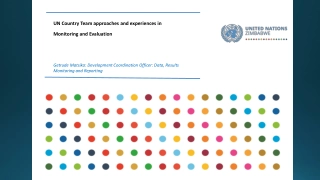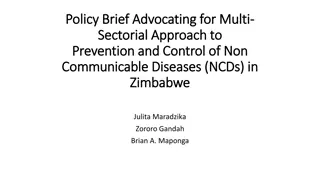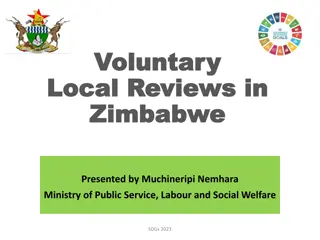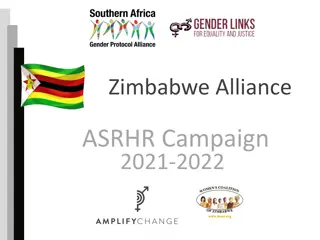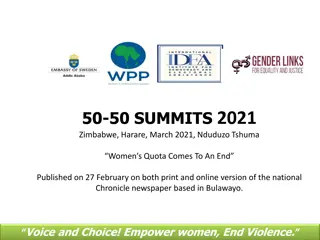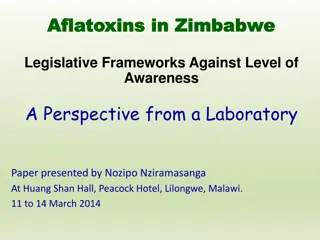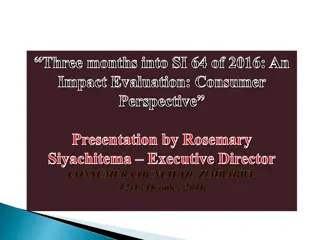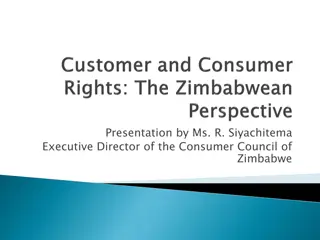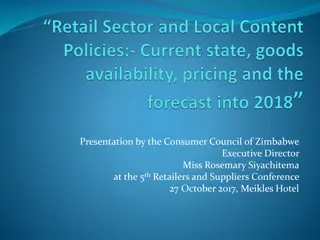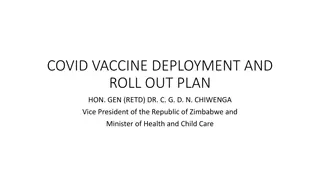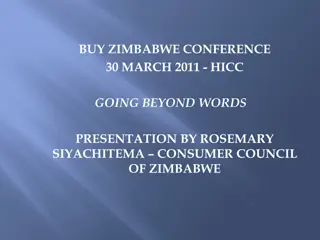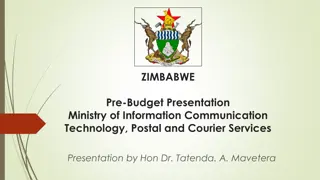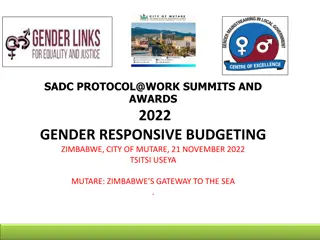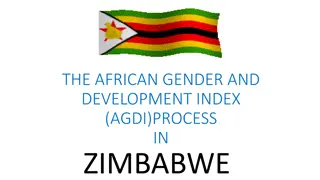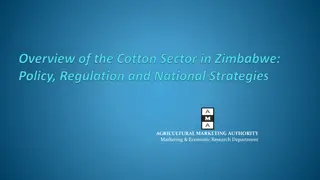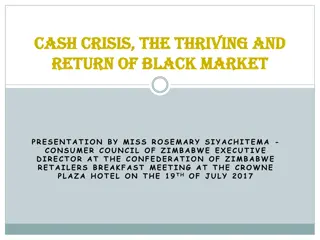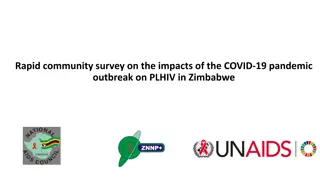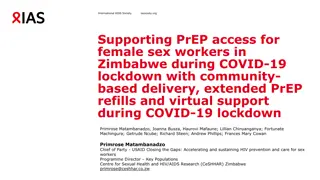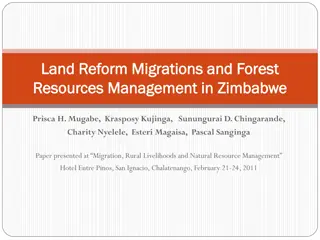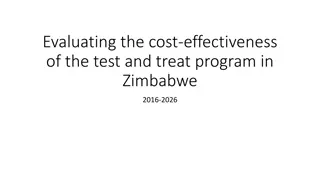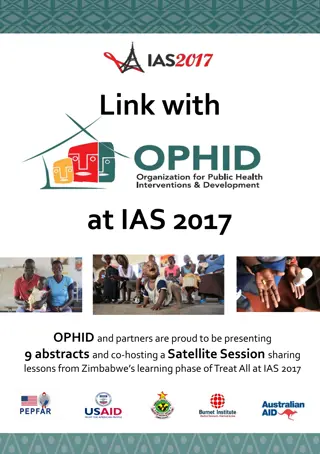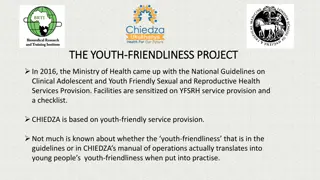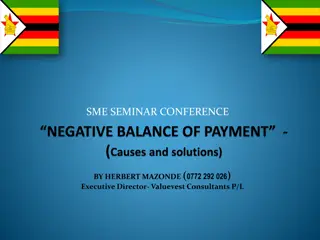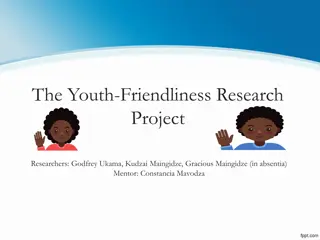UN Country Team Approaches in Monitoring and Evaluation in Zimbabwe
The UN Country Team in Zimbabwe is focused on supporting the government in delivering transformative change for all citizens. They aim to strengthen institutional capacities and empower communities to drive human development and productivity, ultimately leading to a better quality of life for all. T
1 views • 30 slides
Enhancing Youth Engagement for Sub-National SDG Reviews in Zimbabwe
Youth engagement in the Sustainable Development Goals (SDGs) is crucial in Zimbabwe as young people can bring fresh perspectives and drive innovation. To ensure robust sub-national SDG reviews, investment in youth capacity building, more decision-making opportunities, addressing specific youth needs
5 views • 14 slides
Enhancing Utilization of Non-Wage Budget for Education in Zimbabwe
Addressing the underutilization of the non-wage budget for primary and secondary education in Zimbabwe from 2018 to 2022 is crucial to tackle challenges such as a significant number of out-of-school children, lack of adequate infrastructure, and insufficient teaching materials. Efforts have been mad
0 views • 28 slides
Advocating for Multi-Sectorial Approach to NCD Prevention and Control in Zimbabwe
Zimbabwe faces a triple burden of diseases with a significant impact of non-communicable diseases (NCDs). The current policy approach on NCDs needs to change due to the increasing healthcare demands, rise in health expenditure, and implications on national budget and social protection. Key recommend
1 views • 10 slides
Progress in Implementing SDGs and NDS1 in Zimbabwe: National Capacity Building Workshop Insights
Zimbabwe is making strides in SDG and NDS1 implementation through actions such as domesticating SDGs in municipal laws, enhancing capacity building, and aligning policies. Success stories include improving access to water sources, promoting women's economic empowerment, and establishing disability-f
1 views • 14 slides
Development Dynamics of Aviation Networks in Zimbabwe
Aviation plays a crucial role in Zimbabwe's economic growth, with the government focusing on infrastructure development to position the country as a regional aviation hub by 2030. Initiatives include strengthening civil aviation systems, enhancing airport infrastructure, and prioritizing safety and
2 views • 15 slides
Advocating for Water Rights and Dignity of Slum Dwellers in Zimbabwe
Khumbulani Maphosa, a PhD Candidate and MIHR Director, is championing the rights to water, sanitation, housing, and a safe environment for slum dwellers in Zimbabwe. Despite the illegal status of slum settlements in Zimbabwean policies, the constitution recognizes basic rights like clean water and h
2 views • 7 slides
Voluntary Local Reviews in Zimbabwe: Strengthening SDGs 2023 Implementation
Voluntary Local Reviews (VLRs) in Zimbabwe are crucial for monitoring progress in SDGs 2023 implementation. These reviews involve local authorities voluntarily assessing progress, sharing experiences, and fostering inclusiveness. VLRs serve as a platform for localizing the Sustainable Development Go
0 views • 16 slides
Infrastructure Development Bank of Zimbabwe (IDBZ) - Financing Zimbabwe's Infrastructure Needs
The presentation by the Infrastructure Development Bank of Zimbabwe (IDBZ) at the CIFOZ Congress 2018 outlines the critical infrastructure sectors, funding requirements, and the funding gap faced by Zimbabwe. IDBZ is mandated to facilitate infrastructure development in key sectors like ICT, housing,
4 views • 20 slides
Enhancing Adolescent Sexual and Reproductive Health Rights in Zimbabwe: 2021-2022 Campaign
This campaign focuses on improving access to sexual and reproductive health services for adolescents in Zimbabwe through policy analysis, normative frameworks alignment, and targeted actions such as provision of menstrual ware and comprehensive sexuality education. Emphasis is placed on fulfilling S
0 views • 13 slides
Women's Quota and Gender Equality in Zimbabwe: A Call for Action
Highlighting the impending end of the women's quota system in Zimbabwe by 2023, the article discusses its impact on promoting women's political participation. It explores challenges, successes, and the need for supportive mechanisms to achieve gender parity in politics, emphasizing the importance of
0 views • 12 slides
Marriages Laws in Zimbabwe: A Historical Overview
Marriages in Zimbabwe are governed by various Acts such as the Married Person's Property Act and the Marriage Act, each specifying different rules regarding community of property and contract requirements. Since 1929, marriages are considered out of community of property by default, but parties can
0 views • 24 slides
Food Safety Regulations in Zimbabwe: A Detailed Overview
Zimbabwe has established legislative frameworks and regulations to ensure food safety, including limits on aflatoxin levels. The National Food Safety System aims to promote fair trade practices and protect consumers' health. The Food Standard Advisory Board advises on policy issues and legislative f
0 views • 14 slides
Consumer Council of Zimbabwe: Empowering Consumers for Fairness
The Consumer Council of Zimbabwe, founded in 1955, strives to advocate for consumer rights and promote fair trade practices. They work towards empowering consumers and ensuring their voices are heard in economic decisions. With a vision for fair deals and a mission for consumer protection, CCZ pushe
0 views • 19 slides
Impact Evaluation of Statutory Instrument 64 of 2016 on Consumer Prices in Zimbabwe
Statutory Instrument 64 of 2016 in Zimbabwe regulates the importation of various products to promote local production. The legislation does not ban imports but requires licensing for bulk importers. The consumer prices of certain goods increased post-implementation, influenced by factors beyond SI 6
0 views • 14 slides
Challenges of Consumer Rights Protection in Zimbabwe
Zimbabwe faces challenges in protecting consumer rights due to the lack of definitive legal mechanisms. The absence of a Consumer Protection Act has led to unsustainable practices, arbitrary actions, and limited redress for consumers. The country lags in upholding consumer rights compared to regiona
0 views • 14 slides
Benefits of Local Content Policies for Economic Growth in Zimbabwe
The presentation by the Consumer Council of Zimbabwe highlighted the importance of encouraging consumers to buy Zimbabwean products through local content policies. By promoting indigenisation and economic growth, these policies aim to reduce foreign dependency, create jobs, lower production costs, e
1 views • 11 slides
National COVID-19 Vaccine Deployment and Roll-Out Plan in Zimbabwe
The Republic of Zimbabwe is gearing up for the introduction of a COVID-19 vaccine as part of its response to the pandemic, with a focus on deploying 200,000 doses to priority groups. The comprehensive plan includes key strategies, financing alignment, and integration into national governance mechani
5 views • 28 slides
Empowering Zimbabwe Through Buy Zimbabwe Campaign
The Buy Zimbabwe Campaign aims to encourage consumers to prioritize purchasing Zimbabwean products, fostering economic growth and self-sustainability. By engaging the consumer population and highlighting the tangible benefits of buying local, the campaign endeavors to reduce unemployment, enhance se
0 views • 28 slides
Zimbabwe Ministry of ICT Pre-Budget Presentation Highlights
The pre-budget presentation by Hon. Dr. Tatenda A. Mavetera delves into the digital economy vision for Zimbabwe by 2030. It illustrates the budget allocation trends from 2020 to 2024, highlighting significant declines in allocations. The document further addresses the effects of budget allocations o
0 views • 8 slides
Challenges and Progress in Consumer Protection in Zimbabwe
Zimbabwe currently lacks a definitive consumer protection mechanism at law, relying on the goodwill of service providers. The Consumer Council of Zimbabwe (CCZ) operates without legal enforcement powers, primarily focusing on consumer education. The country can benefit from adopting the UN Guideline
0 views • 20 slides
Gender-Responsive Budgeting in Zimbabwe: A Case Study of Mutare City Council
The City of Mutare in Zimbabwe is implementing gender-responsive budgeting as per the SADC Protocol on Gender and Development. The council has a gender policy ensuring inclusivity in budgeting, guided by national policies and frameworks. Stakeholders, including women, youth, and people with disabili
0 views • 19 slides
The African Gender and Development Index (AGDI) Process in Zimbabwe
The AGDI process in Zimbabwe involved training a team in Addis in June 2015 to join the continental initiative. The work plan included setting up the National Advisory Council, conducting research, and preparing the AGDI report for submission to the Economic Commission for Africa. The constitution a
0 views • 10 slides
Zimbabwe Viral Load Clinic: Laboratory Interface Learning Session and Country Context Update
Zimbabwe hosted a vital learning session on viral load clinic laboratory interfaces and the epidemiology of HIV in the country. The session aimed to sensitize participants on the VL CLI, introduce the LARC team, and identify gaps in managing clients on ART with high viral loads. The country context
0 views • 18 slides
Overview of Cotton Production and Value Chain in Zimbabwe
Cotton production in Zimbabwe plays a crucial role in improving rural livelihoods and the economy. Over 200,000 smallholder farmers are engaged in cotton production, making it a significant source of income, employment, and export earnings. The cotton value chain involves various players like farmer
0 views • 13 slides
Zimbabwe HIV Viral Load Testing Overview
Zimbabwe's plan to scale up HIV viral load testing from 2018 to 2020 is outlined, with targets set for each year. The country has made significant progress in expanding its viral load testing capacity, going from targeted testing to near-universal coverage by 2018. Various testing laboratories in Zi
0 views • 9 slides
Addressing the Cash Crisis and Informal Economy in Zimbabwe
The presentation by Miss Rosemary Siyachitema at the Confederation of Zimbabwe Retailers Breakfast Meeting highlighted the challenges of the ongoing cash crisis in Zimbabwe. Major causes include the introduction of Bond Notes and Statutory Instruments, dependency on foreign currency, declining inves
0 views • 7 slides
Rapid Community Survey on COVID-19 Impact on PLHIV in Zimbabwe
This rapid community survey in Zimbabwe assessed the impact of the COVID-19 pandemic on people living with HIV (PLHIV). Conducted online through platforms like SurveyMonkey and WhatsApp, the survey focused on access to preventative materials, HIV treatment, information on COVID-19 prevention, and ps
0 views • 30 slides
Contrasting Shona and English Languages in Zimbabwe
The language of Shona in Zimbabwe, Africa, differs from English in various aspects such as script symbols, alphabet, official usage, borrowing of words, and number of speakers. Shona has a script with 35 symbols, while English has a 26-letter alphabet. English is the official language of the USA, wh
0 views • 5 slides
PrEP Uptake Among Female Sex Workers in Zimbabwe During COVID-19 Lockdown
Hypothesized peer-led community-based provision of PrEP services positively influenced PrEP uptake among female sex workers in Zimbabwe. Despite national commodity shortages, PrEP initiation rates peaked at 51% in September 2020, with 33.7% of 19,407 sex workers initiating PrEP. The highest initiati
0 views • 9 slides
Migration, Land Reform, and Resources Management in Zimbabwe
Study conducted in Chimanimani district of Zimbabwe examines the impact of land reform on migration patterns, livelihood strategies, and natural resource use. Different settlement models pre and post-independence are analyzed, highlighting changes in agricultural practices, forest resource utilizati
0 views • 30 slides
Post-Colonial Struggles and African Literature Representation in Zimbabwe
In Zimbabwe, the complexities of Ndebele-Shona history, the repercussions of Gukurahundi massacres, and the challenges of post-colonial state-building intersect with the portrayal of Africa in Western literature. Scholars like Sabelo Ndlovu-Gatsheni and Sarah Brouillette critique how Zimbabwean expe
0 views • 12 slides
The Legacy of Gukurahundi: Ndebele Particularism in Post-Crisis Zimbabwe
A campaign of terror known as Gukurahundi targeted the Ndebele people in Matabeleland, Zimbabwe, with over 20,000 civilians killed in the 1980s. This dark chapter continues to haunt the country as the Ndebele's experiences and history are marginalized by the dominant Shona narrative. Ndebele particu
0 views • 9 slides
Evaluation of Cost-Effectiveness of Test and Treat Program in Zimbabwe (2016-2026)
This evaluation focuses on the cost-effectiveness of the Test and Treat program in Zimbabwe from 2016 to 2026. It analyzes the background population, funding structure, decline in MTCT rate, factors fueling HIV spread, and the methodology used. The program aims to simulate transmission trends in hig
0 views • 22 slides
Lessons Learned from Zimbabwe's Treat All Program at IAS 2017
OPHID and partners presented 9 abstracts and co-hosted a Satellite Session at IAS 2017, sharing insights from Zimbabwe's learning phase of Treat All. The abstracts covered topics such as HIV testing, viral load monitoring, mental health screening, and more. The event highlighted successes and challe
0 views • 4 slides
Investigating Youth Experiences at CHIEDZA for Youth-Friendly Services in Zimbabwe
This study aims to investigate young people's perceptions of the youth-friendliness of sexual and reproductive health services provided by CHIEDZA in Zimbabwe. By exploring their experiences and understanding of comprehensive health services, the research seeks to inform stakeholders on improving yo
0 views • 4 slides
Understanding Balance of Payments and Mineral Endowment in Zimbabwe
This presentation covers key topics such as Balance of Payments, including its importance, role in economic planning, and impact on foreign dependence. Additionally, it discusses Zimbabwe's mineral endowment in terms of estimated resources and annual extraction rates for various minerals like gold,
0 views • 17 slides
Youth Friendliness Research Project in Zimbabwe
The Youth Friendliness Research Project in Zimbabwe aims to explore young people's experiences of accessing health services, specifically focusing on the CHIEDZA study. The project investigates youth perceptions of youth-friendly services and the challenges faced by young researchers conducting the
0 views • 13 slides
Unlocking Potential for Coal Subsector in Zimbabwe: Insights by Linos Masimura
Linos Masimura, Chairman of the Coal Producers Association in Zimbabwe, highlights the growth in the coal sector with more than 6 operating mines by 2023. He emphasizes the need for stable electricity supply, currency stability, policy consistency, accessible financing, fair payment terms, and acces
0 views • 6 slides
Development Agenda for Zimbabwe: Addressing Key Fundamentals of Life
Zimbabwe, located in southern Africa, is rich in minerals and investment potential. The evolution of citizens has led to the establishment of international and regional institutions to address their needs. Global development plans prioritize areas such as economic growth, food security, health, infr
0 views • 28 slides
